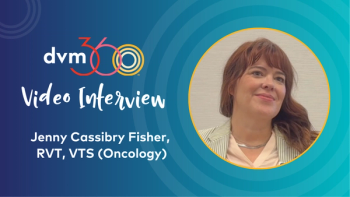
Keeping up with noncompete clauses in veterinary employment contracts
Massachusetts, among other states, is looking to ban these controversial clauses you may find when signing on as an associate.
As many readers are likely aware, California has been unique in its position that noncompetition clauses do not belong in associate employment contracts. The legislature in the Golden State has felt substantial pressure from a number of industries to create a "level playing field" for employers, in particular information technology firms, in vying for the best and brightest job seekers. Silicon Valley professionals, as well as veterinary associates, have consequently become the vicarious beneficiaries of the anti-noncompete movement.
(THINKSTOCK)
Now other states are taking up the challenge of reevaluating the appropriateness of noncompete language in veterinary employment contracts. As a result, the commonwealth of Massachusetts is marking up a bill intended to ban noncompetition clauses from such contracts. It appears from recent statements from legislators that the Massachusetts governor is prepared to sign such a bill. A number of other states are entertaining the enactment of such laws, as well.
As I've followed this trend, it's made me consider the practical impact that a state's noncompete ban might have on veterinary hospitals, the recruiting of associates and the changes in business plans that practices may undertake in order to adapt to the new legislation.
Surely there won't be any further noncompete language in those states that enact laws similar to that in California. But what other practical trends might be seen in a world where competition is more abundant and practice becomes increasingly corporate?
Putting pressure on non-compete states
One of the benefits of being a veterinarian is the flexibility the job offers in terms of hours and location of work. This aspect of the career is particularly important to younger veterinarians and those who leave full-time practice to raise children.
Between the widespread availability of positions in clinical veterinary work and the existence of license reciprocity among many states, the only real obstacle keeping an associate veterinarian from moving from job to job is a noncompete clause in an employment contract.
As some state governments move toward eliminating that last hurdle, young veterinarians—and those reentering the profession—could look to work in a state where their lateral movement is unencumbered. Veterinary clinics in states that eventually enact prohibitions against noncompetition language could end up with a larger pool of potential associate applicants.
Competitive corporate advantage
Single, standalone veterinary clinics have a very different business model from veterinary hospital chains or roll-ups. Mom-and-pop clinics frequently operate based on the owner's personality rather than a single-minded focus on top-line revenue and bottom-line earnings.
While Smith Animal Hospital may have been around for decades and folks line up around the block to see Dr. Smith, Vet Clinics of North America, Inc. (VCNA) boasts a large, liquid supply of general practitioners, any of whom can call a client into the exam room on that client's next visit. VCNA doesn't require each individual veterinarian to be a local icon—it leaves that task to the brand and then hires associates who provide high-quality veterinary service.
So in a hypothetical state where noncompetes are made illegal, large corporate practices are bound to benefit for two reasons. First, as I mentioned earlier, there may well be that dynamic equilibrium pushing associate candidates into states without noncompetes. Second, since the corporate business model doesn't require that a strong personal bond exist between doctor and client, the big multidoctor practices will suffer less when a former associate decides to join or buy a nearby practice.
Contract negotiations
Albany, N.Y., is a great town and lots of youngsters from there head off to veterinary school. The town is so nice that plenty of those kids tend to move back home to take their first professional job. When newly minted Dr. Jones receives his diploma from Cornell and heads off for interviews in the Albany-Troy area, what can you expect him to say when he's handed a contract containing a two-year, 12-mile noncompete clause?
Dr. Jones might very well remind his interviewer, if things unfold legislatively as anticipated, that nearby Adams, Mass., has similar jobs available without noncompete clauses.
Overworked and desperate for help, the Albany clinic will likely do what's necessary to get Dr. Jones to sign on the dotted line. Namely, pare the noncompete down by a year and be satisfied with 3 or 4 miles.
Buying and selling disadvantage
Legislators frequently don't have a complete handle on the nuances of the areas they legislate. Unless you have been in business, you don't likely understand the difference between the concepts of a noncompete in a pure employment agreement and of a noncompete in the context of a practice sale. State legislation making veterinary employment noncompetes void or illegal must distinguish between a situation where an associate is prohibited from seeking employment in a nearby area and the situation where a noncompete is an element of practice goodwill in an arms-length practice sale transaction.
When an owner sells a veterinary hospital, one of the most valuable items the buyer purchases is the agreed-upon forbearance of the seller to compete with the business he just sold. The noncompete promise of the seller is part and parcel of the deal and the inability to be able to enforce such an agreement would be devastating to practice sellers and buyers alike.
So now that you know more about the legislation regarding noncompete clauses—think twice before signing your next contract.
Dr. Christopher Allen is president of Associates in Veterinary Law PC, which provides legal and consulting services to veterinarians. Call (607) 754-1510 or e-mail
Newsletter
From exam room tips to practice management insights, get trusted veterinary news delivered straight to your inbox—subscribe to dvm360.




